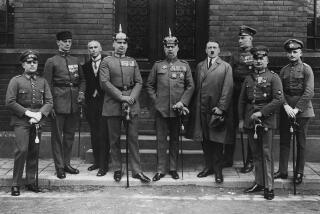A Contradiction He Couldn’t Ignore
- Share via
COTTBUS, Germany — Bureaucrats aren’t customarily known for bold gestures and East Germans were never trained to take lonely stands on tough issues. So why is Juergen Mueller, a government paper-pusher in this depressed former East German industrial city, taking the law, if not exactly into his own hands, then to places it hasn’t been before?
Mueller, 53, a department director for a small state agency that disburses social welfare aid to the elderly, has pulled the plug on such payments to one Heinz Barth, an elderly former SS man serving a life sentence for war crimes.
“Our feeling--not just me, but nearly the entire staff here--is that it is simply unjust to use tax money to pay pensions for war criminals,” says Mueller.
Lots of Germans are of Mueller’s mind. But until now, no one thought they could do anything about an existing system that lets Third Reich war criminals collect “victim’s pensions,” atop their regular, monthly old-age payments.
In the early 1950s, the West German parliament classified any veteran injured in World War II a “victim” of the conflict, eligible for compensation. Legislators debated whether to include war criminals and decided that they should be: The pension system shouldn’t be used as an instrument of punishment, lawmakers agreed. Though that reasoning may have been widely acceptable in the 1950s, it has gathered its critics over the years. German journalists and a few minority-party politicians recently have taken a closer look at who gets “victim’s pensions.”
They have come up with uncomfortable facts. Of the 1,081,393 people now receiving the supplements, an estimated 50,000 are former members of Hitler’s elite SS units--the Fuhrer’s most fanatical “death angels”--or participants in massacres and other war crimes, or their widows. Together, they collect some $400 million per year from the German treasury.
More remarkable, some of the compensated “victims” are not even Germans but foreigners who collaborated with occupying German forces in the war. Journalists from the German television show “Panorama” recently uncovered in Latvia a social club of elderly SS veterans. They still get together to wear shreds of their old uniforms and toast the German government for its largess.
Latvian Jewish concentration-camp survivors, by contrast, get no such “victim” payments. Though Germany has compensated Jewish Holocaust victims in many countries, including the United States, the Cold War kept it from arranging packages for Jewish survivors in the Eastern Bloc.
A few German officials, troubled by all this, have long considered cutting off “victim” payments to war criminals. Volker Beck, a member of parliament for the environmentalist Green Party, has unsuccessfully pressed legislation to this end for years. But it has always died for lack of mainstream-party support.
State pension administrators, meantime, have also occasionally considered dropping SS veterans from “victim” rolls. But, in the end, they have given up, claiming their hands were tied by the law and its specific inclusion of war criminals.
Not Mueller. He says he blocked Barth’s monthly “victim” checks in hopes of launching a test-case that would ultimately travel to the Constitutional Court, Germany’s highest body for constitutional matters. There, Mueller likes to believe, judges will be forced to take on the unpleasant question of who in Germany was truly a victim of Adolf Hitler’s 12-year rule, who was a criminal--and what to do in the many cases where criminals argue they are victims.
Asked why, the soft-spoken Mueller--a man who gives the impression of just barely hiding his feelings behind a veneer of bureaucratic blandness--suggests that his rearing in the former East may be a factor.
“Maybe we’re more sensitive to the problem because we’ve had a second experience with dictatorship,” he says, referring to the Communist regime that set up shop in eastern Germany immediately after the Nazis were gone. “Perhaps, today, as officials in a democratic system, we feel more obliged to support and strengthen democracy, for instance by addressing contradictions in the laws.”
And talk about contradictions. It would be hard to find one more glaring than that presented in the case of Heinz Barth.
In summer 1944, he was a field-grade officer attached to an SS unit that sacked a French village in the wake of the Normandy invasion. In just five hours, the Germans killed 642 people in Oradour-sur-Glane, nearly the entire village population, including 202 children. Men were herded into barns and shot; women and children were locked in the church, which was then set ablaze. The village was reduced to a burned-out ruin. It remains that way to this day under French historic-preservation laws.
Barth didn’t order the massacre, but he did take part, according to his subsequent trial record, and argued that he was obeying orders. In “Murderer of Oradour,” a published East German book about his trial, he is quoted as testifying that, “I was very ambitious and eager to fulfill the orders given to me.
“The order was to march on Oradour-sur-Glane by midday, to burn the whole place down and to eliminate every person, from babies to old men,” he testified. Several months after the massacre, Barth was promoted to lieutenant colonel.
After the war, he settled near Potsdam, in what became East Germany, and became a textile buyer for a state department store chain. In 1983, when his activities in Oradour became known, he was put on trial and sentenced to life in prison. A Berlin panel upheld the East German conviction after the demise of the Communist state.
*
How could such a man be classified a “victim” of the war? Because, two weeks or so after the Oradour massacre, in a separate operation on the Western Front, Barth lost a leg.
In East German times, that wasn’t enough to make him a “victim.” Unlike West Germany, the Communist state didn’t offer “victim pensions” but rather something called “honor pensions” for those who had served time in concentration camps, gone into exile or performed other deeds deemed heroic by the German Democratic Republic.
Barth didn’t qualify.
It was German unification, and the extension of the West German pension system to the East, that converted him into a “victim,” virtually overnight. He began receiving about $450 per month, which he reportedly sends to his family. Barth, still in prison, is unavailable for interviews.
But even as the end of the Cold War was opening such rewarding new doors for the likes of Barth, it was slamming them shut in the faces of certain East German “honor pension” recipients: elderly “heroes” against Hitler who were now suspected of being too close to the Communist regime that succeeded the Nazis in the East. No parliamentary niceties for these suspects about not using the pension system as an instrument of punishment: If they wanted to keep getting their money, they had to clear their names.
Mueller says it was this contradiction that moved him to act: The thought that a convicted war criminal was getting easy money while elderly men, once considered courageous figures in the fight against fascism, were now schlepping paperwork from office to office, trying to establish their innocence.
“Many of these victims really suffered under Hitler,” he says. “Now they’re old and they’re not in the habit of fighting for their rights. The laws aren’t simple and sometimes they have problems finding their way through the jungle of bureaucracy.”
Mueller knows that his gut feelings will count for little when his action against Barth comes before a judge. Barth has already filed suit. “We have to find legal grounds for withdrawing these payments,” says Mueller. “And this isn’t easy.”
Still, Germany seems, finally, to be warming to the idea of revising its “victim pension” laws. Interest here has intensified in recent months in learning more about the Nazi past--particularly whether the SS was the criminal outfit and the Wehrmacht a “clean” army, as many veterans insist, or whether, as a growing body of research suggests, practically anybody was capable of atrocities.
This public discussion has translated into support for Mueller’s activities. The legislature for the state of Brandenburg has formally registered its approval, and Mueller says he has received letters from officials in two other states--this time in the former West--saying that they, too, are now thinking of blocking “victim” payments to war criminals.
And in Bonn, the Social Democrats--Germany’s largest opposition party--have lent their support to Volker Beck’s latest bill to divert “victim’s” money from war criminals, and make sure it lands in the pockets of real victims, in places like Latvia. “I hope they’ll keep the ball in motion,” says Mueller. “We’re just a small authority here.”
More to Read
Sign up for Essential California
The most important California stories and recommendations in your inbox every morning.
You may occasionally receive promotional content from the Los Angeles Times.













